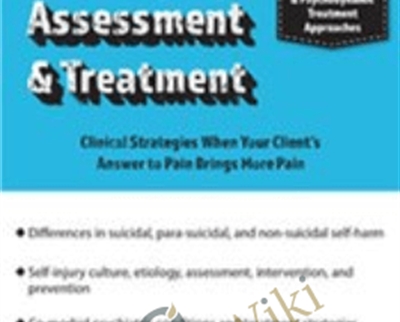Self-Injury Assessment & Treatment: Clinical Strategies When Your Client’s Answer to Pain Brings More Pain – David G. Kamen
$77.00
6 Hours 06 Minutes
David Kamen, PhD, will equip you with practical, evidence-based tools to assess and treat deliberate self-harm, along with other co-morbid psychiatric disorders including major depressive disorder, obsessive-compulsive disorder, eating disorders, and substance abuse. Effective triage, coordination of care, and risk-management practices for your work with self-injury patients, their parents, families, and friends will be addressed.
Description
Purchase Self-Injury Assessment & Treatment: Clinical Strategies When Your Client’s Answer to Pain Brings More Pain – David G. Kamen Course at eBokly. We actively participate in group buys and are committed to sharing knowledge with a wider audience. What's more, our courses maintain the same quality as the original sale page. You have the option to buy directly from the sale page at the full price (sale page link is provided within the post).
Whether the behavior is cutting, burning, piercing, starving, purging, head banging, or some other method, self-harming behaviors and the emotions underlying them know no bounds with respect to race, ethnicity, age, socioeconomic class, or gender. Feeling shame and embarrassment, those who engage in self-harm may privately console themselves, or befriend other self-injurious peers – which can further intensify the lethality and suicidal intent of their acts. Studies show that professionals who work with adults and youth who self-injure find it to be one of the most challenging psychological issues to treat.
David Kamen, PhD, will equip you with practical, evidence-based tools to assess and treat deliberate self-harm, along with other co-morbid psychiatric disorders including major depressive disorder, obsessive-compulsive disorder, eating disorders, and substance abuse. Effective triage, coordination of care, and risk-management practices for your work with self-injury patients, their parents, families, and friends will be addressed.
The theoretical and cultural reasons for this epidemic will be explored. Practical approaches that work for individual, group, and family psychotherapy in inpatient, outpatient, school, and community settings will be shared, along with resources to prepare professionals and caregivers to help those who engage in self-injury.
- Implement crisis theory for understanding where your client is when you first meet
- Exlore a simple metaphor to create a four part coping measure for client and caregiver self-inventory
- Analyze the benefits of teaching clients to communicate through the use of metaphors to increase their formal and informal support systems
- Establish a listening and communicating approach that brings core feelings to the surface so clients can deal with the core emotional components of their grief
- Communicate the challenges grief has in a society not supportive of public expression of what is being experienced
- Anticipate ethical conflicts that occur when confronted by grief that create a risk for countertransference
SELF-INJURY DIAGNOSIS AND TREATMENT COORDINATION
- Review the spectrum of self-injurious behaviors
- Epidemiology of adult and youth self-injury
- Triage of self-Injury, including:
- Level-of-care assessment
- Lethality risk- and protective-factor assessment
- Functional behavioral analysis of self-injury
- DSM-5® and ICD-10 diagnostic advances
- Mental status examination
- Identification and treatment of co-morbid disorders
- Treatment planning
- Coordination of care amongst mental health professionals, educators, and healthcare professionals
- Specialized clinical personality and art therapy assessment
COGNITIVE-BEHAVIORAL, NEUROBIOLOGICAL, FAMILY SYSTEMS, AND PSYCHODYNAMIC ASSESSMENT AND TREATMENT APPROACHES:
- Motivational interviewing; development of therapeutic alliance
- Exposure with response prevention to extinguish self-injurious behaviors
- Dialectical behavior therapy tactics
- Coping skills to break the habit of self-injury
- Intersubjective and interpersonal therapeutic communication techniques
- The corrective emotional experience and empathic dialogue
- Exposure and resolution of self-injury defense mechanisms
PROFESSIONAL ETHICS, CASE MANAGEMENT, AND LIABILITY RISK MANAGEMENT
- Review of bioethical and legal risk management principles, including
- HIPAA compliance, duty-to-warn issues; ethical and legal dilemmas
- Tips for:
- Professional self-care
- Peer-to-peer collaboration and supervision, to prevent clinician burnout and vicarious traumatization
REVIEW OF PROFESSIONAL, PATIENT, AND CONSUMER-FOCUSED INTERNET RESOURCES AND APPS FOR:
- Self-injury psychoeducation
- Clinical assessment
- Motivational and therapeutic alliance-assessment
- Mental health case law and professional ethics websites
- Self-monitoring of self-injury thoughts, feelings, and behaviors
- Internet resources that are immediately usable for schools, parents, and clients
- Educational and therapeutic use of social networking sites
- YouTube
- Other
Tag: Self-Injury Assessment & Treatment: Clinical Strategies When Your Client’s Answer to Pain Brings More Pain – David G. Kamen Review. Self-Injury Assessment & Treatment: Clinical Strategies When Your Client’s Answer to Pain Brings More Pain – David G. Kamen download. Self-Injury Assessment & Treatment: Clinical Strategies When Your Client’s Answer to Pain Brings More Pain – David G. Kamen discount.
Purchase the Self-Injury Assessment & Treatment: Clinical Strategies When Your Client’s Answer to Pain Brings More Pain – David G. Kamen course at the best price at eBokly. Upon completing your purchase, you will gain access to the downloads page. where you can conveniently retrieve all associated course files. Additionally, we will send you a download notification email to your registered mail.
Unlock your full potential with our Self-Injury Assessment & Treatment: Clinical Strategies When Your Client’s Answer to Pain Brings More Pain – David G. Kamen courses. Our courses are meticulously designed to empower you with the skills and knowledge needed for excellence.
Why wait? Take the first step towards greatness by acquiring our Self-Injury Assessment & Treatment: Clinical Strategies When Your Client’s Answer to Pain Brings More Pain – David G. Kamen courses today. We ensure a smooth and secure purchasing experience that guarantees your peace of mind. Rest assured that your financial information is safeguarded through our trusted payment gateways, Stripe and PayPal.
Stripe, renowned for its robust security measures, offers a secure and dependable payment process. Your sensitive data is encrypted using state-of-the-art technology, ensuring its confidentiality throughout the transaction.
PayPal, a globally recognized payment platform, adds an extra layer of security. With its buyer protection program, you can make your purchase with confidence, knowing that your financial details are protected, allowing you to focus on your learning journey.
Is it secure? to Use of?
- Rest assured, your identity remains completely confidential. We do not share your information with anyone, ensuring the utmost security when you buy the Self-Injury Assessment & Treatment: Clinical Strategies When Your Client’s Answer to Pain Brings More Pain – David G. Kamen course.
- 100% Safe Checkout Privateness coverage
- We employ robust communication and encryption methods to protect sensitive information. All card numbers are encrypted using AES at rest-256, and the transmission of card numbers occurs in a separate hosting environment, without sharing or storing any data.
How Will the Course Be Delivered?
- Upon successful payment for the “Self-Injury Assessment & Treatment: Clinical Strategies When Your Client’s Answer to Pain Brings More Pain – David G. Kamen course”, Most of the products will come to you immediately. But for some products were posted for offer. Please wait for our response, it might take a few hours due to the time zone difference.
- If this occurs, kindly be patient. Our technical department will process the link shortly, and you will receive notifications directly via email. Your patience is greatly appreciated.
What Shipping Methods Are Available?
- You will receive a download link in the invoice or in YOUR ACCOUNT.
- The course link is always accessible. Simply log in to your account to download the Self-Injury Assessment & Treatment: Clinical Strategies When Your Client’s Answer to Pain Brings More Pain – David G. Kamen course whenever you need.
- You can study online or download the content for better results, making it accessible from any device. Ensure your system does not go to sleep during the download process..
How Do I Track Order?
- We promptly update the status of your order following your payment. If, after 7 days, there is no download link provided, the system will automatically process a refund..
- We love to hear from you. Please don’t hesitate to email us with any comments, questions and suggestions.
You must be logged in to post a review.

 Purchase this course you will earn
Purchase this course you will earn 




Reviews
There are no reviews yet.